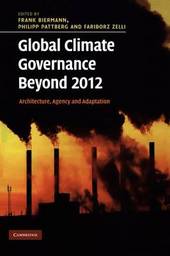
|
Global Climate Governance Beyond 2012: Architecture, Agency and Adaptation
Hardback
Main Details
Description
An assessment of policy options for future global climate governance, written by a team of leading experts from the European Union and developing countries. Global climate governance is at a crossroads. The 1997 Kyoto Protocol was merely a first step, and its core commitments expire in 2012. This book addresses three questions which will be central to any new climate agreement. What is the most effective overall legal and institutional architecture for successful and equitable climate politics? What role should non-state actors play, including multinational corporations, non-governmental organizations, public-private partnerships and market mechanisms in general? How can we deal with the growing challenge of adapting our existing institutions to a substantially warmer world? This important resource offers policy practitioners in-depth qualitative and quantitative assessments of the costs and benefits of various policy options, and also offers academics from wide-ranging disciplines insight into innovative interdisciplinary approaches towards international climate negotiations.
Author Biography
Frank Biermann is professor and head of the Department of Environmental Policy Analysis in the Institute for Environmental Studies at the Vrije Universiteit Amsterdam, The Netherlands. He is also director-general of the Netherlands Research School for the Socio-economic and Natural Sciences of the Environment (SENSE); director of the Global Governance Project, a network of twelve European research institutions (glogov.org); and chair of the Earth System Governance Project, a ten-year global research programme under the auspices of the International Human Dimensions Programme on Global Environmental Change. His most recent publications are Partnerships, Governance and Sustainable Development (edited with P. Glasbergen and A. P. J. Mol, Elgar, 2007); International Organizations in Global Environmental Governance (edited with B. Siebenhuner and A. Schreyogg, Routledge, 2009); and Managers of Global Change: The Influence of International Environmental Bureaucracies (edited with B. Siebenhuner, MIT Press, 2009). Philipp Pattberg is an assistant professor of international relations, Department of Environmental Policy Analysis, Institute for Environmental Studies, Vrije Universiteit Amsterdam, The Netherlands. He is also the management committee chair of the European COST Action 'The Transformation of Global Environmental Governance: Risks and Opportunities' and deputy director and research coordinator of the Global Governance Project, a network of twelve leading European institutions in the field of global environmental governance. In addition, Philipp Pattberg is the academic director of a series of PhD training schools on the Human Dimensions of Global Environmental Change, supported by the EU Marie Curie Programme. His most recent publication is Private Institutions and Global Governance: The New Politics of Environmental Sustainability (Edward Elgar, 2007). Fariborz Zelli is a research fellow at the German Development Institute in Bonn, Germany. He is also a visiting fellow at the Tyndall Centre for Climate Change Research, United Kingdom, where he was a senior research associate from 2006 to early 2009. Since 2004, he has been a research fellow of the Global Governance Project, where he co-coordinates the research group Multiple Options, Solutions and Approaches: Institutional Interplay and Conflict (MOSAIC).
|